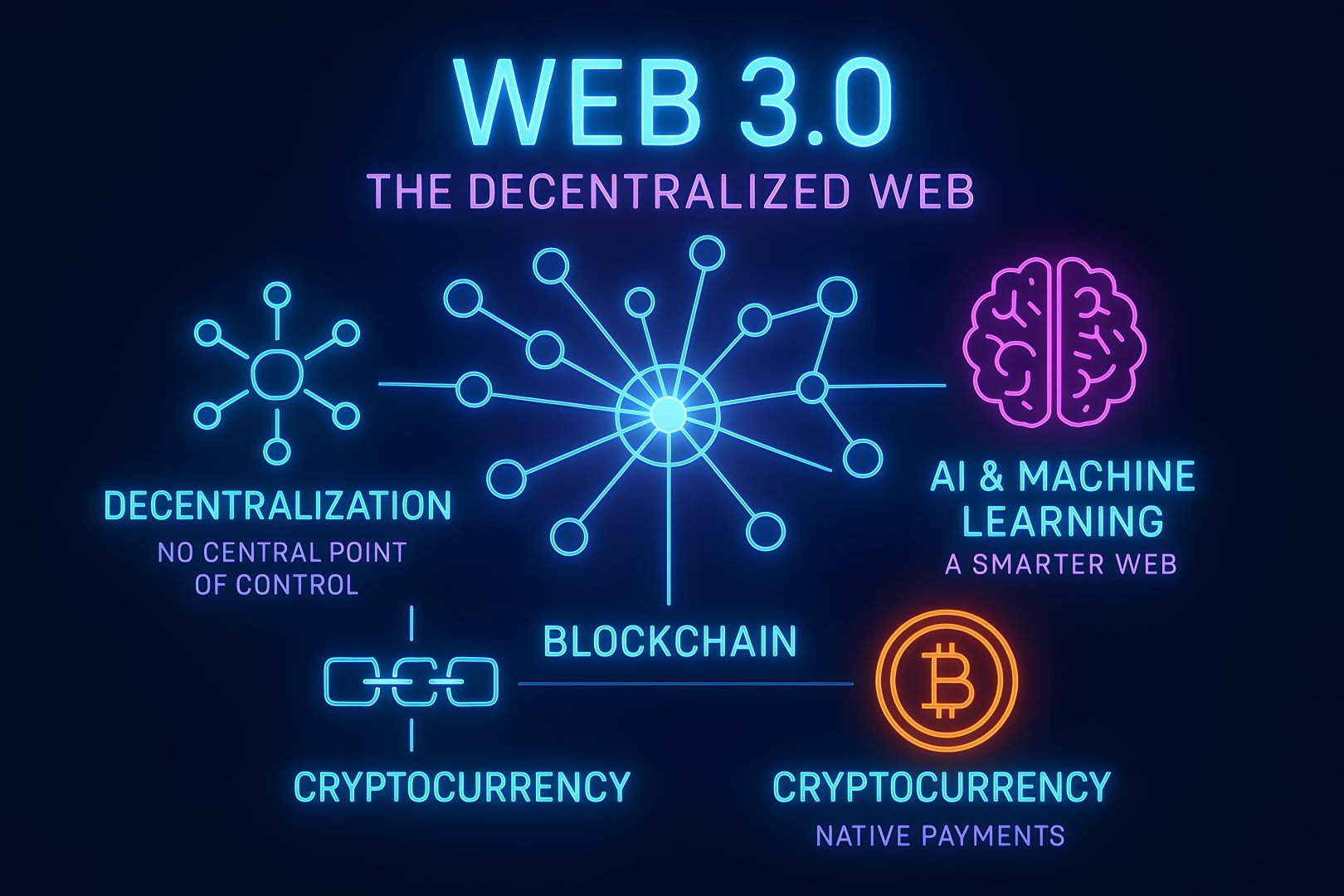Web3 Domains and Decentralized TLDs: A Complete Guide

What Are Web3 Domains?
Web3 domains represent a paradigm shift in how we think about internet naming systems. Unlike traditional domains managed by ICANN (Internet Corporation for Assigned Names and Numbers) and domain registrars, Web3 domains are built on blockchain technology and operate as NFTs (non-fungible tokens) on decentralized networks like Ethereum, Polygon, and others.
These domains use alternative top-level domains (TLDs) such as .crypto, .eth, .nft, .dao, .wallet, and .blockchain. Rather than annual renewals through registrars, you typically purchase these domains once and own them permanently as blockchain assets stored in your cryptocurrency wallet.
How Web3 Domains Work
Web3 domains function fundamentally differently from traditional DNS (Domain Name System). Here's how they operate:
Blockchain-Based Registry
Instead of centralized DNS servers, Web3 domains are recorded on blockchain networks. When you register a domain like "yourname.crypto," the ownership is recorded as a smart contract on the blockchain. This creates an immutable, transparent record of ownership that cannot be seized, censored, or altered by any central authority.
Cryptocurrency Wallet Integration
Web3 domains are intrinsically linked to cryptocurrency wallets. They serve dual purposes: as website addresses and as human-readable addresses for cryptocurrency transactions. Instead of sending Bitcoin to a complex address like "1A1zP1eP5QGefi2DMPTfTL5SLmv7DivfNa," you can send it to "alice.crypto" if that domain is configured to resolve to that wallet address.
Resolution Services
For Web3 domains to function as website addresses, browsers need special resolution services. Companies like Unstoppable Domains and ENS (Ethereum Name Service) provide browser extensions and partnered browsers that can resolve these addresses. Some browsers like Brave and Opera have built-in support for resolving certain Web3 domains.
The Accessibility Challenge
This brings us to the critical question: Are Web3 domains accessible like traditional domains? The short answer is not yet, and not without additional steps.
Limited Browser Support
Unlike traditional .com, .net, or .org domains that work in any browser immediately, Web3 domains require special support. Most mainstream browsers—including Chrome, Safari, Firefox, and Edge in their default configurations—cannot natively resolve Web3 domains. Users must either:
- Install browser extensions provided by Web3 domain services
- Use browsers with built-in support (Brave, Opera)
- Configure special DNS gateways
- Access through Web3 gateway services that bridge to traditional DNS
Gateway Solutions
To make Web3 domains accessible to regular internet users, gateway services create bridges. For example, Unstoppable Domains allows you to link your .crypto domain to an IPFS (InterPlanetary File System) website, and they provide gateways at URLs like "yourname.crypto.xyz" that anyone can access. However, this defeats some of the decentralization purpose and creates dependency on the gateway provider.
Pros of Web3 Domains
True Ownership
Once purchased, you own the domain permanently as a blockchain asset. There are no renewal fees, no risk of forgetting to renew, and no registrar can revoke your ownership. This is particularly valuable in regions with restrictive internet policies or for controversial content that might face domain seizure risks.
Censorship Resistance
Because ownership is recorded on a decentralized blockchain, no single entity can censor or seize your domain. Governments, corporations, or hackers cannot easily take control of your Web3 domain without access to your private keys.
Simplified Crypto Transactions
Web3 domains provide human-readable addresses for cryptocurrency transactions across multiple blockchains. One domain can resolve to different wallet addresses for Bitcoin, Ethereum, Litecoin, and dozens of other cryptocurrencies, simplifying the transaction process.
Integration with Decentralized Services
These domains integrate seamlessly with the growing Web3 ecosystem, including decentralized applications (dApps), decentralized storage (IPFS, Arweave), and blockchain-based identity systems. They position you for the potential future of a more decentralized internet.
No Renewal Hassles
The one-time purchase model eliminates the administrative burden of tracking renewal dates and prevents the common problem of accidentally losing valuable domains to expiration.
Cons of Web3 Domains
Limited Accessibility
The most significant drawback is accessibility. If you're running a business or website that needs to reach mainstream audiences, a Web3 domain alone won't cut it. The majority of internet users cannot easily access these domains without technical steps they're unlikely to take.
Higher Upfront Costs
While there are no renewal fees, the initial purchase price for Web3 domains is often significantly higher than traditional domain registration. Premium Web3 domains can cost hundreds or thousands of dollars, compared to $10-15 annually for traditional domains.
Technical Complexity
Managing Web3 domains requires understanding cryptocurrency wallets, blockchain transactions, gas fees, and smart contracts. Losing access to your wallet means losing your domain permanently—there's no "forgot password" option or customer support to recover it.
Lack of Legal Framework
The legal status of Web3 domains remains unclear in many jurisdictions. Dispute resolution mechanisms like UDRP (Uniform Domain-Name Dispute-Resolution Policy) that exist for traditional domains don't apply. Trademark protection and cybersquatting issues are largely unresolved.
SEO and Discovery Challenges
Search engines like Google primarily index traditional websites. Web3 domains face significant challenges in search engine optimization and discovery. Most businesses need a traditional domain for visibility and use Web3 domains as complementary assets.
Dependency on Third-Party Infrastructure
Despite claims of decentralization, most users rely on centralized services like Unstoppable Domains, ENS, or gateway providers to make their Web3 domains functional. True peer-to-peer resolution is still largely theoretical for average users.
Practical Use Cases for Web3 Domains
Web3 domains currently work best for specific use cases rather than as complete replacements for traditional domains:
- Cryptocurrency Payment Addresses: Simplifying crypto transactions with memorable addresses
- Blockchain Identity: Creating persistent identities across decentralized applications
- NFT Collections and Projects: Branding for Web3-native projects and communities
- Censorship-Resistant Publishing: Hosting content that might face takedown risks on traditional platforms
- Future-Proofing: Securing brand names in anticipation of broader Web3 adoption
The Hybrid Approach
For businesses and content creators, the most practical approach currently is maintaining both traditional and Web3 domains. Use a traditional domain like yoursite.com for your main web presence, reliable web hosting, and search engine visibility, while securing corresponding Web3 domains for brand protection, crypto functionality, and positioning in the emerging decentralized ecosystem.
At Falcon Internet, we provide traditional web hosting solutions that ensure your website is accessible to everyone, with robust disaster recovery and backup solutions that protect your online presence. While Web3 technology evolves, having a solid foundation with proven hosting infrastructure remains essential.
The Future of Web3 Domains
Web3 domains represent an interesting technological development with genuine use cases, but they're not yet ready to replace traditional domains for most purposes. The accessibility barrier remains the primary obstacle to mainstream adoption. Until major browsers natively support Web3 domain resolution without extensions or gateways, these domains will remain niche tools rather than universal solutions.
For early adopters, blockchain enthusiasts, and those building in the Web3 space, these domains offer unique benefits. For businesses seeking reliable, accessible web presence, traditional domains paired with quality hosting remain the practical choice. As the technology matures and adoption grows, we may see better integration between traditional and decentralized naming systems, but that future is still developing.
Whether you're exploring Web3 domains or sticking with traditional infrastructure, understanding the trade-offs helps you make informed decisions about your online presence. And regardless of your choice, having reliable hosting infrastructure and proper backup strategies remains crucial for any web project.
Related Articles


Website Downtime: How Much Does It Really Cost Your Business?
October 29, 2025

Understanding Cloud Repatriation - When to Leave AWS or Azure
October 28, 2025